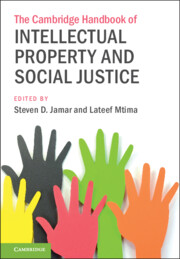Book contents
- The Cambridge Handbook of Intellectual Property and Social Justice
- The Cambridge Handbook of Intellectual Property and Social Justice
- Copyright page
- Dedication
- Contents
- About the Contributors
- Foreword
- Prolusion: What Is Intellectual Property (And Why Should You Care About It Anyway?) – A Layperson’s Guide to Intellectual Property Law
- Introduction: Intellectual Property Social Justice Theory: History, Development, and Description
- Part I IP Social Justice Foundations
- Part II IP Social Justice in Major Intellectual Property Domains
- Part III IP Social Justice: Historical Perspectives
- Part IV IP Social Justice in the Political Economy: Engaging Activism; Achieving Change
- Part V IP Social Justice in the Information Age
- Part VI Intellectual Property Social Justice in Global Perspective: Issues in Gender and Development Disparity
- 19 Intellectual Property Social Justice on the International Plane
- 20 Intellectual Property, Social Justice, and Human Development
- 21 Controversial Trademarks: A Comparative Analysis
- 22 The Role of Nonrightsholder Advocates and Academics in Achieving Social Justice Balance in Copyright: The Case of Colombia
- 23 Exposing Gender Bias in Intellectual Property Law: The UK Music Industries
- Part VII IP Social Justice: The Future of the Global IP Ecosystem
19 - Intellectual Property Social Justice on the International Plane
from Part VI - Intellectual Property Social Justice in Global Perspective: Issues in Gender and Development Disparity
Published online by Cambridge University Press: 04 January 2024
- The Cambridge Handbook of Intellectual Property and Social Justice
- The Cambridge Handbook of Intellectual Property and Social Justice
- Copyright page
- Dedication
- Contents
- About the Contributors
- Foreword
- Prolusion: What Is Intellectual Property (And Why Should You Care About It Anyway?) – A Layperson’s Guide to Intellectual Property Law
- Introduction: Intellectual Property Social Justice Theory: History, Development, and Description
- Part I IP Social Justice Foundations
- Part II IP Social Justice in Major Intellectual Property Domains
- Part III IP Social Justice: Historical Perspectives
- Part IV IP Social Justice in the Political Economy: Engaging Activism; Achieving Change
- Part V IP Social Justice in the Information Age
- Part VI Intellectual Property Social Justice in Global Perspective: Issues in Gender and Development Disparity
- 19 Intellectual Property Social Justice on the International Plane
- 20 Intellectual Property, Social Justice, and Human Development
- 21 Controversial Trademarks: A Comparative Analysis
- 22 The Role of Nonrightsholder Advocates and Academics in Achieving Social Justice Balance in Copyright: The Case of Colombia
- 23 Exposing Gender Bias in Intellectual Property Law: The UK Music Industries
- Part VII IP Social Justice: The Future of the Global IP Ecosystem
Summary
Statements tying geography to destiny reflect a deterministic idea of politics arising from early theories of geopolitics. “Geography is destiny” captures the idea that certain geographical regions have strategic, economic, and political advantages. The epigraph also extends beyond states to the truism that not all individuals and communities have the same opportunity to have access to resources,1 to contribute to the global economy of innovation,2 and to benefit from the global cumulative wealth. In some areas, it is more self-evident that the benefit-sharing systems are “a kind of lottery where the luckiest individuals and populations participate and win a portion of the benefits and others, also in great need but without similar resources, are left out of the process completely.”3
- Type
- Chapter
- Information
- Publisher: Cambridge University PressPrint publication year: 2024

